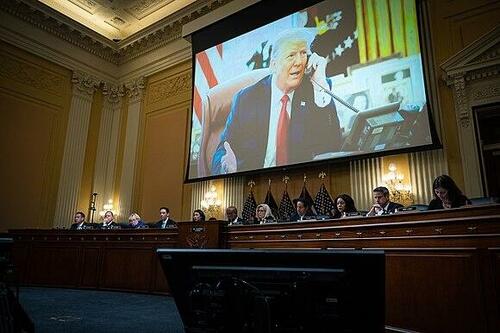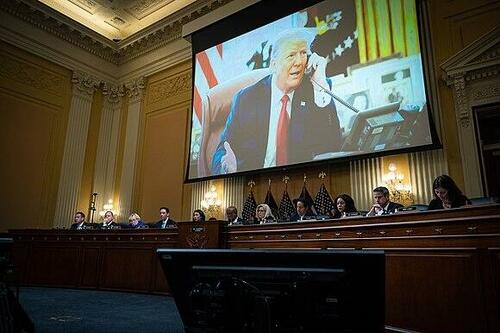Congress’s Jan. 6 Investigation Looks Less And Less Credible
On Jan. 6, 2021, the nation was rocked by the disruption of the certification of Joe Biden as our next president. With Donald Trump set to return to the White House in 2025, it is astonishing how much of that day remains a matter of intense debate.
Those divisions are likely only to deepen after a slew of recent reports that have challenged the selective release of information from the House January 6 Committee.
January 6 remains as much a political litmus test as it is a historical event. Whether you refer to that day as a riot or an insurrection puts you on one side or the other of a giant political chasm. I viewed the attack on that day as a desecration of our constitutional process, but I did not view it as an insurrection. I still don’t.
It was a protest that became a riot when a woefully insufficient security plan collapsed. And that is a view shared by most Americans. One year after the riot, a CBS poll showed that 76 percent viewed it as a “protest gone too far.”
A Harvard study also found that those arrested on that day were motivated by loyalty to Trump rather than support for an insurrection.
A recent poll found that almost half of the public (43 percent) felt that “too much is being made” of the riot and that it is “time to move on.”
Of course, that still leaves a little over half who view the day as “an attack on democracy.”
The continued distrust of the official accounts of Jan. 6 reflects a failure of the House Democrats, and specifically former House Speaker Nancy Pelosi (D-Calif.), to guarantee a credible and comprehensive investigation.
The House Select Committee to investigate January 6 was comprised of Democrat-selected members who offered only one possible view: that January 6 was an attempt to overthrow our democracy by Trump and his supporters. The committee hired a former ABC News producer to create a slick, made-for-television production that barred opposing views and countervailing evidence. The members, including Republican Vice Chair Liz Cheney, played edited videotapes of Trump’s speech that removed the portion where Trump called on his supporters to protest “peacefully.”
The committee fostered false accounts, including the claim that there was a violent episode with Trump trying to wrestle control of the presidential limousine. The Committee knew that the key Secret Service driver directly contradicted that account offered by former White House aide Cassidy Hutchinson.
While the Democrats insisted that Trump’s speech constituted criminal incitement, he was never charged with that crime — not even by the motivated prosecutors who pledged to pursue such charges. The reason is that Trump’s speech was entirely protected under the First Amendment. Such a charge of criminal incitement would have quickly collapsed in court.
Nevertheless, the Washington Post, NPR, other media and the committee members called Jan. 6 an “insurrection” engineered by Trump. Figures such as Rep. Jamie Raskin (D-Md.) insisted the committee had evidence that Trump organized a “coup” on Jan. 6, 2021. That evidence never materialized.
The lack of adequate security measures that day has long puzzled many of us. After all, there had been a violent riot at the White House before January 6, in which more officers were injured and Trump had to be moved to a secure location. The National Guard had to be called out to protect the White House, but those same measures (including a fence) were not ordered at the Capitol.
Two of the recent reports offered new details related to those questions.
One report confirmed that Trump did, in fact, offer the deployment of the National Guard in anticipation of the protest. The Jan. 6 Committee repeatedly dismissed this claim. After all, it would be a rather curious attempt at an insurrection if Trump was suggesting the use of thousands of troops to prevent any breach of Congress. The committee specifically found “no evidence” that the Trump administration called for 10,000 National Guard members to be sent to Washington, D.C., to protect the Capitol. The Washington Post even supposedly “debunked” Trump’s comments with an award of “Four Pinocchios.”
Yet evidence now shows that Trump personally suggested the deployment of 10,000 National Guard troops to prevent violence. For example, a transcript includes the testimony of former White House Deputy Chief of Staff Anthony Ornato in January 2022 with Liz Cheney present. Ornato states that he clearly recalled Trump’s offer of 10,000 troops.
Videotapes have also emerged showing Pelosi privately admitting that she and Democratic leadership were responsible for the security failure on Jan. 6.
Another new report from Rep. Barry Loudermilk (R-Ga.), who chairs the House Administration’s Subcommittee on Oversight, shows that it was the Defense Department that delayed the eventual deployment of National Guard in the critical hours of the riot.
The evidence shows that, at 3:18 p.m., Army Secretary Ryan McCarthy “tells sheltering Members of Congress that he is not blocking the deployment of the National Guard and, while referencing the D.C. National Guard, shares that ‘We have the green light. We are moving.’” However, the secretary of the Army’s own timeline indicates that the DCNG did not physically leave the Armory until 5 pm.
That was the critical period for the riot. Around 2:10 p.m., people surged up the Capitol steps. Just an hour later, McCarthy said troops were on their way. At 4:17 p.m., Trump made his public statement asking rioters to stop — roughly an hour and a half later. Yet it was not until 5 pm that the troops actually left for the Capitol.
The House is also under greater scrutiny this week for new information on the shooting of the only person to die on Jan. 6. While Democrats have referred to many deaths on that day, the only person who died in the riot itself was Ashli Babbitt, a protester shot by Capitol Police.
I have long disagreed with the findings of investigations by the Capitol Police and the Justice Department in clearing Captain Michael Byrd for this shooting. The media lionized Byrd and, in sharp contrast to other police shootings during that period, blamed the deceased. Again, an unjustified shooting of a protester would not fit the media narrative.
The concerns over the shooting were heightened by the Justice Department’s bizarre review and report, which notably did not state that the shooting was justified. Instead, it declared that it could not prove “a bad purpose to disregard the law” and that “evidence that an officer acted out of fear, mistake, panic, misperception, negligence, or even poor judgment cannot establish the high level of intent.”
Babbitt, 35, was an Air Force veteran who was clearly committing criminal acts of trespass, property damage and other offenses at the time she was shot. However, Babbitt was unarmed when she tried to climb through a broken window.
Byrd stated “I could not fully see her hands or what was in the backpack or what the intentions are.” In other words, Byrd admitted he did not see a weapon. He took Babbitt’s effort to crawl through the window as sufficient justification to kill her. It was not. And it is worth noting that Byrd could just as well have hit the officers standing just behind Babbitt.
The new report confirms that Byrd had prior disciplinary and training issues, including “a failed shotgun qualification test, a failed FBI background check for a weapon’s purchase, a 33-day suspension for a lost weapon and referral to Maryland state prosecutors for firing his gun at a stolen car fleeing his neighborhood.” In one incident, detailed in a letter from Loudermilk, Byrd was suspected of lying about the circumstances under which he shot at the fleeing car.
None of this means that Trump or even Babbitt are without fault in this matter. Trump’s speech was clearly “reckless and wrong,” and Babbitt herself was involved in that riot. However, these reports only further highlight what we still do not know about that day.
* * *
Jonathan Turley is the Shapiro professor of public interest law at George Washington University and the author of “The Indispensable Right: Free Speech in an Age of Rage.”
Tyler Durden
Tue, 11/26/2024 – 09:20


